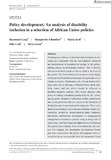| dc.contributor.author | Lang, Raymond | |
| dc.contributor.author | Schneider, Marguerite | |
| dc.contributor.author | Kett, Maria | |
| dc.contributor.author | Cole, Ellie | |
| dc.contributor.author | Groce, Nora | |
| dc.date.accessioned | 2021-02-24T11:51:17Z | |
| dc.date.available | 2021-02-24T11:51:17Z | |
| dc.date.issued | 2019 | |
| dc.identifier.citation | Lang, R, Schneider, M, Kett, M, Cole, E, Groce, N. Policy development: An analysis of disability inclusion in a selection of African Union policies. Dev Policy Rev. 2019; 37: 155– 175. https://doi.org/10.1111/dpr.12323 | |
| dc.identifier.uri | https://opendocs.ids.ac.uk/opendocs/handle/20.500.12413/16188 | |
| dc.description.abstract | Contemporary debates in international development discourse are concerned with the non‐tokenistic inclusion and participation of marginalized groups in the policy‐making process in developing countries. This is directly relevant to disabled people in Africa, which is the focus of this article. The United Nations Convention on the Rights of Persons with Disabilities delineates the principles of inclusion in society. Furthermore, the African Union (AU) plays a key role in advising its Member States about disability issues, and this advice should be reflected in disability‐inclusive policies. This article analyses nine policy or strategy documents produced by the AU, covering the policy domains of education, health, employment and social protection that are crucial to the inclusion of disabled people in international development. These were analysed according to seven discrete elements (rights, accessibility, inclusivity, implementation plans, budgetary allocations, enforcement mechanisms or disaggregated management information systems) using a rating scale of one to four, with four being the highest level of inclusion. The process (for example, level of consultation), the context (for example, the Sustainable Development Goals) and actors involved in the policy development were reviewed as far as was possible from the documents. None of the policies reached even 50% of the total possible score, indicating poor levels of genuine inclusion. Rights scored a highest rating, but still at a low level. This suggests that there is recognition of the rights of disabled people to inclusion, but this is not generally integrated within inclusive implementation plans, budgetary allocations, enforcement mechanisms or disaggregated management information systems for monitoring. The limited socio‐economic inclusion of disability within AU policies is a lost opportunity that should be reviewed and rectified. The findings have broader ramifications for the non‐tokenistic and genuine involvement of poor and marginalized groups in the international policy‐making arena. | |
| dc.publisher | John Wiley & Sons Ltd | |
| dc.rights.uri | http://creativecommons.org/licenses/by/4.0/ | |
| dc.title | Policy development: An analysis of disability inclusion in a selection of African Union policies | |
| dc.type | Article | |
| dc.rights.holder | © 2017 The Authors. Development Policy Review published by John Wiley & Sons Ltd on behalf of Overseas Development Institute | |
| dc.identifier.externaluri | http://dx.doi.org/10.1111/dpr.12323 | |
| dc.identifier.ag | ES/L008785/1 | |
| dc.identifier.doi | 10.1111/dpr.12323 | |


